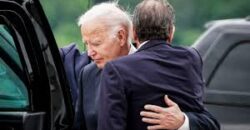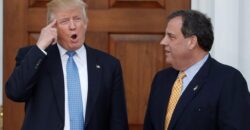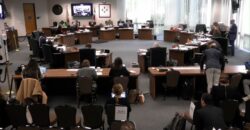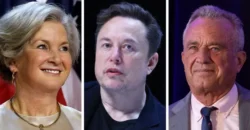When President Yoon Suk Yeol of South Korea visited the White House last year, he charmed the Washington establishment by singing Don McLean’s “American Pie.” When he flew to Tokyo to usher in a new era of conciliation with Japan, it was a genial visit, with the prime minister treating Mr. Yoon to “omurice,” a Japanese dish that the South Korean leader likes.
But that mood was gone on Wednesday, a day after Mr. Yoon imposed — and then rescinded — martial law in South Korea. Officials in the United States and Japan were scrambling to understand why the leader they’d both embraced had made such a shocking authoritarian move.
Now, the domestic political chaos unleashed by Mr. Yoon could imperil the countries’ three-way alliance in the Pacific, where they had been fortifying their relationships to confront an increasingly assertive China and North Korea.
The disorder in South Korea — where cabinet members on Wednesday were offering to resign and opposition lawmakers were moving to impeach Mr. Yoon — comes on top of political uncertainty in both the United States and Japan. Last month, former President Donald J. Trump, a notoriously mercurial leader who tried to undermine American alliances while in power, was elected to a second term.
And in October, Japanese voters delivered a resounding blow to the longtime governing party and the new prime minister, Shigeru Ishiba, denying them a majority in Parliament.
“Many in the world were counting on Japan and South Korea, along with Australia and others, to keep the flag flying and keep the head of good governance and democracy above water in the face of this incredible pressure from North Korea, China and Iran and Russia,” said Daniel Russel, a vice president at the Asia Society who was the assistant secretary of state for Asia under President Barack Obama.
Before Tuesday, most international policy experts had been far more concerned about unpredictability in Washington. During Mr. Trump’s first term as president, he often accused South Korea and Japan of siphoning off American military resources, even threatening to pull troops out of South Korea. And at pomp-filled summits in Singapore and Hanoi, he engaged the North Korean leader, Kim Jong-un, in direct personal diplomacy, trying and failing to reach a deal on reducing the North’s nuclear arsenal.
Now, it is not only Mr. Trump’s return to power that makes the three-way alliance look volatile.
“Yoon’s self-inflicted wounds, combined with the now-weakened Japanese leadership, leaves the U.S. with two weak players in pushing back against China,” said Bruce Klingner, a senior research fellow for Northeast Asia at the Heritage Foundation in Washington. Just a few months ago, Mr. Klingner said, “the potential weak link was changes in U.S. policy.”
The events of Tuesday night in Seoul are already yielding ripple effects. American and South Korean military officials have postponed a high-level meeting to discuss nuclear deterrence issues.
Japan’s defense minister, Gen Nakatani, said he “would like to keep a close eye on how the situation develops” before confirming a visit to South Korea. Mr. Ishiba, the prime minister, who had been discussing a January trip to Seoul, said he was monitoring the situation with “grave interest.”
One reason the three-way alliance now looks so fragile is that, to some extent, it has depended on the personalities and priorities of the countries’ leaders. Convivial photos of Mr. Yoon, then-Prime Minister Fumio Kishida of Japan and President Biden at a summit last year at Camp David, looking casual without neckties, suggested a friendly bond between them.
“There was certainly an element of serendipity in the group of leaders who were committed to all of this,” said Christopher Johnstone, a senior associate at the Center for Strategic and International Studies and a former director for East Asia on the National Security Council in the Biden administration.
With Mr. Trump’s return to the White House just weeks away, the next political turnover could happen in Seoul if the motion to impeach Mr. Yoon passes. Analysts predict he would be succeeded by his main rival, Lee Jae-myung, leader of the liberal Democratic Party, which could shift South Korea’s foreign policy stance. Mr. Lee’s party has typically shied away from close relations with the United States and with Japan, with which South Korea has long-running tensions stemming from Japan’s colonial occupation of the Korean Peninsula.
A government under Democratic Party leadership would be “more likely to want to hedge between China and the U.S. and downplay the importance of trilateral security cooperation with Tokyo and Washington,” Lauren Richardson, a lecturer in international relations at Australian National University, wrote in an email.
In many ways, the relationship between Japan and South Korea is the most important link of the three-way alliance, said Ji-Young Lee, a professor of international relations and Korean studies at American University in Washington, who credited Mr. Yoon with pushing for the rapprochement with Japan despite some public opposition.
The stronger trilateral relationship was made possible in the first place because of improved relations between Japan and South Korea, Ms. Lee said. “It was primarily the work of Yoon Suk Yeol and his desire to improve relations with Japan, and if you take that out of the picture, then you are really talking about a great deal of uncertainty for the future of Japan-Korean relations,” she added.
There were signs of fragility in that relationship just last month, when South Korean officials boycotted a ceremony organized by Japan to commemorate workers at gold mines on Sado Island. South Korea has long protested the fact that Japan has not acknowledged or apologized for the conscription of Koreans during World War II to work in the mines, which were recently designated a UNESCO World Heritage Site.
Kunihiko Miyake, a former Japanese diplomat, said he hoped the two governments, regardless of who was in charge, would continue to build on the recent efforts to improve relations, if only to survive the struggle for supremacy between the United States and China.
South Korean officials “know the reality — their population is shrinking, their economy is bad and they cannot count on the Americans and they can’t count on the Chinese,” said Mr. Miyake. “So we need to work together — the Japanese and the Koreans.”
Despite the developments in Seoul, uncertainty in Washington could still be the bigger risk, analysts say. “The biggest elephant is the United States,” said Nobukatsu Kanehara, a professor of political science at Doshisha University in Kyoto. The trilateral partnership consists of “a whale plus two dolphins,” he added.
Mr. Kanehara said he feared that Mr. Trump, who prefers “strong men,” might regard both Mr. Yoon, if he lasts until Mr. Trump’s inauguration, and Mr. Ishiba of Japan as weak leaders.
Some analysts said Mr. Trump’s return was not the only issue for American policy in Asia. By not forcefully condemning Mr. Yoon’s declaration of martial law, the Biden administration showed “the gap between our rhetoric and the reality of our actions,” said David C. Kang, a senior fellow at the Quincy Institute for Responsible Statecraft, a research group in Washington.
“We’re willing to say we love rule of law and democracy and everything else, but we will just blatantly ignore this kind of behavior because the guy is on our side,” Mr. Kang said. “But the rest of the world is not stupid. They see this, and they are very skeptical of the U.S. administration.”









